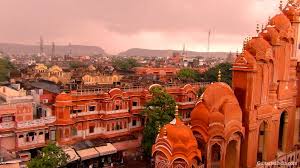Chapter: English essay writing topics, sample examples for school, college students and Competitions
Travel : Jaipur

Jaipur
At
Jaipur we were fortunate in having an introduction to one of the great thakurs
of the State. He was a mighty land holder, the owner of twenty villages
with populations ranging from five hundred to as many thousands, a feudal lord
who paid for his fief (until, a year or two ago, a somewhat simpler and more
modern system of tenure was introduced) by contributing to the State army one
hundred and fifty armed and mounted men. This nobleman was kind enough to place
his elephant at our disposal.
It
was a superb and particularly lofty specimen, with gold-mounted tusks; ate two
hundredweights of food a day and must have cost at least six hundred a year to
keep. An expensive pet. But for a man in the thakur's position,
we gathered, indispensable, a necessity. Pachyderms in Rajputana are what glass
coaches were in Europe a century and a half ago - essential luxuries.
The thakur
was a charming and cultured man, hospitably kind as only Indians can be.
But at the risk of seeming ungrateful, I must confess, that, of all the animals
I have ever ridden, the elephant is the most uncomfortable mount. On the level,
it is true, the motion is not too bad. One seems to be riding on a small
chronic earthquake; that is all. The earthquake becomes more disquieting when
the beast begins to climb. But when it goes downhill, it is like the end of the
world. The animal descends very slowly and with an infinite caution, planting
one huge foot deliberately before the other, and giving you time between each
calculated step to anticipate the next convulsive spasm of movement - a spasm
that seems to loosen from its place every organ in the rider's body, that
twists the spine, that wrenches all the separate muscles of the loins and
thorax. The hills round Jaipur are not very high. Fortunately; for by the end
of the three or four hundred feet of our climbing and descending, we had almost
reached the limits of our endurance. I returned full of admiration for
Hannibal. He crossed the Alps on an elephant.
We
made two expeditions with the pachyderm; one - over a rocky pass entailing,
there and back, two climbs and two sickening descents - to the tanks and ruined
temples of Galta, and one to the deserted palaces of Amber. Emerging from the
palace precincts - I record the trivial and all too homely incident, because it
set me mournfully reflecting about the cosmos - our monster halted and, with
its usual deliberation, relieved nature, portentously. Hardly, the operation
over, had it resumed its march when an old woman who had been standing at the
door of a hovel among the ruins, expectantly waiting - we had wondered for what
- darted forward and fairly threw herself on the mound of steaming excrement.
There was fuel here, I suppose, for a week's cooking. "Salaam,
Maharaj," she called up to us, bestowing in her gratitude the most opulent
title she could lay her tongue to. Our passage had been to her like a sudden
and unexpected fall of manna. She thanked us, she blessed the great and
charitable Jumbo for his Gargantuan bounty.
Our
earthquake lurched on. I thought of the scores of millions of human beings to
whom the passage of an unconstipated elephant seems a godsend, a stroke of
enormous good luck. The thought depressed me. Why are we here, men and women,
eighteen hundred millions of us, on this remarkable and perhaps unique planet?
To what end? Is it to go about looking for dung - cow dung, horse dung, the
enormous and princely excrement of elephants? Evidently it is - for a good many
of us at any rate. It seemed an inadequate reason, I thought, for our being
here - immortal souls, first cousins of the angels, own brothers of Buddha and
Mozart and Sir Isaac Newton.
But a
little while later I saw that I was wrong to let the consideration depress me.
If it depressed me, that was only because I looked at the whole matter from the
wrong end, so to speak. In painting my mental picture of the dung-searchers I
had filled my foreground with the figures of Sir Isaac Newton and the rest of
them. These, I perceived, should have been relegated to the remote background
and the foreground should have been filled with cows and elephants. The picture
so arranged, I should have been able to form a more philosophical and
proportionable estimate of the dung-searchers. For I should have seen at a
glance how vastly superior were their activities to those of the animal
producers of dung in the foreground. The philosophical Martian would admire the
dung-searchers for having discovered a use for dung; no other animal, he would
point out, has had the wit to do more than manufacture it.
We
are not Martians and our training makes us reluctant to think of ourselves as
animals. Nobody inquires why cows and elephants inhabit the world. There is as
little reason why we should be here, eating, drinking, sleeping, and in
the intervals reading metaphysics, saying prayers, or collecting dung. We are
here, that is all; and like other animals we do what our native capacities
and our environment permit of our doing. Our achievement, when we compare it with
that of cows and elephants, is remarkable. They automatically make dung; we
collect it and turn it into fuel. It is not something to be depressed about; it
is something to be proud of. Still, in spite of the consolations of philosophy,
I remained pensive.
(From Jesting Pilate)
Related Topics